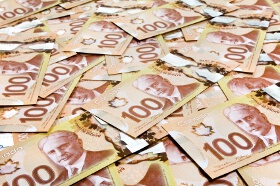The Canadian dollar is rising midweek after the US government reported soft inflation levels. The loonie is also getting a lift on market expectations that US crude oil inventories will record a contraction. This comes as market sentiment pertaining to the short-term health of the currency is split.
On Tuesday, the producer price index (PPI) fell 0.2%, beating market projections of 0.1%. The wholesale costs of goods slipped 0.4%, driven by the steep 13% decline in gasoline prices. The cost of services dipped 0.1% for the first time in four months. Wholesale food prices rose 2.6%. Overall, the increase in wholesale inflation in 2018 was 2.5%.
US crude futures kicked off the Wednesday trading session sideways as investors wait for the Energy Information Administration (EIA)âs weekly supply report. Analysts do anticipate a decrease of 250,000 barrels in crude stockpiles, an increase of 2.6 million barrels for gas, and a jump of 900,000 barrels for distillates.
February West Texas Intermediate (WTI) crude futures tacked on $0.04, or 0.08%, to $52.16 a barrel on Wednesday on the New York Mercantile Exchange.
CIBC Capital Markets published a report this week, sounding the alarm about the Canadian dollar. Authors said that the loonie will tumble in the coming weeks because traders will benefit from âthe oversold nature of the pair [USD/CAD].â The dollar will continue to receive its near-term cues from developments in the global energy sector.
Other research from the major banks expect short-term consolidation for the loonie, including HSBC and Scotiabank, but do expect a bullish performance in the medium-term. Overall, the January rally will potentially come to a screeching halt.
While crude will play a major role in the loonieâs trend, the Bank of Canada (BOC)âs interest rate policy will be an important factor. Last year, it raised interest rates three times to its current 1.75% level, leaving many to expect more rate hikes in 2019. However, the BOC has hinted that it will take a more cautious approach to rates amid economic uncertainty and rising debt levels, though the neutral point is in the range of 2.5% and 3.5%.
The USD/CAD currency pair fell 0.17% to 1.3243, from an opening of 1.3267, at 14:13 GMT on Wednesday. The EUR/CAD dropped 0.32% to 1.5091, from an opening of 1.5141.
If you have any questions, comments or opinions regarding the Canadian Dollar,
feel free to post them using the commentary form below.
Canadian Dollar Rises on Soft US Inflation, Crude Supply Contraction
